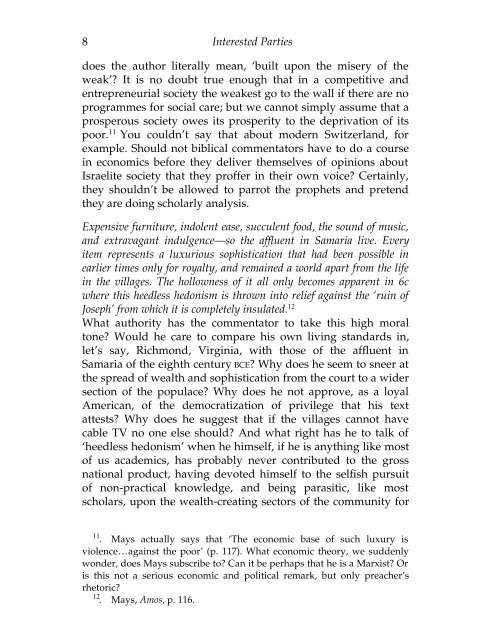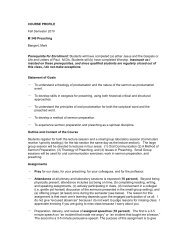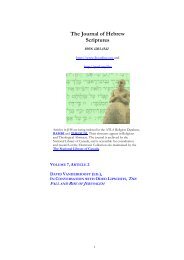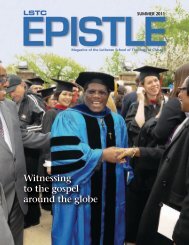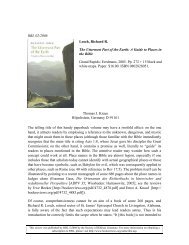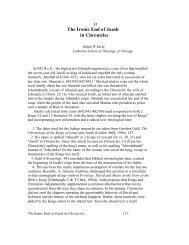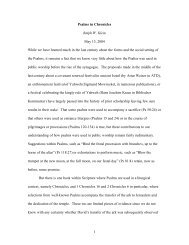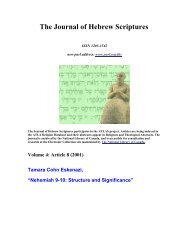Metacommentating Amos* Metacommentary, what is that ... - Fontes
Metacommentating Amos* Metacommentary, what is that ... - Fontes
Metacommentating Amos* Metacommentary, what is that ... - Fontes
You also want an ePaper? Increase the reach of your titles
YUMPU automatically turns print PDFs into web optimized ePapers that Google loves.
8 Interested Partiesdoes the author literally mean, ‘built upon the m<strong>is</strong>ery of theweak’? It <strong>is</strong> no doubt true enough <strong>that</strong> in a competitive andentrepreneurial society the weakest go to the wall if there are noprogrammes for social care; but we cannot simply assume <strong>that</strong> aprosperous society owes its prosperity to the deprivation of itspoor. 11 You couldn’t say <strong>that</strong> about modern Switzerland, forexample. Should not biblical commentators have to do a coursein economics before they deliver themselves of opinions aboutIsraelite society <strong>that</strong> they proffer in their own voice? Certainly,they shouldn’t be allowed to parrot the prophets and pretendthey are doing scholarly analys<strong>is</strong>.Expensive furniture, indolent ease, succulent food, the sound of music,and extravagant indulgence—so the affluent in Samaria live. Everyitem represents a luxurious soph<strong>is</strong>tication <strong>that</strong> had been possible inearlier times only for royalty, and remained a world apart from the lifein the villages. The hollowness of it all only becomes apparent in 6cwhere th<strong>is</strong> heedless hedon<strong>is</strong>m <strong>is</strong> thrown into relief against the ‘ruin ofJoseph’ from which it <strong>is</strong> completely insulated. 12What authority has the commentator to take th<strong>is</strong> high moraltone? Would he care to compare h<strong>is</strong> own living standards in,let’s say, Richmond, Virginia, with those of the affluent inSamaria of the eighth century BCE? Why does he seem to sneer atthe spread of wealth and soph<strong>is</strong>tication from the court to a widersection of the populace? Why does he not approve, as a loyalAmerican, of the democratization of privilege <strong>that</strong> h<strong>is</strong> textattests? Why does he suggest <strong>that</strong> if the villages cannot havecable TV no one else should? And <strong>what</strong> right has he to talk of‘heedless hedon<strong>is</strong>m’ when he himself, if he <strong>is</strong> anything like mostof us academics, has probably never contributed to the grossnational product, having devoted himself to the self<strong>is</strong>h pursuitof non-practical knowledge, and being parasitic, like mostscholars, upon the wealth-creating sectors of the community for11 . Mays actually says <strong>that</strong> ‘The economic base of such luxury <strong>is</strong>violence . . . against the poor’ (p. 117). What economic theory, we suddenlywonder, does Mays subscribe to? Can it be perhaps <strong>that</strong> he <strong>is</strong> a Marx<strong>is</strong>t? Or<strong>is</strong> th<strong>is</strong> not a serious economic and political remark, but only preacher’srhetoric?12 . Mays, Amos, p. 116.


